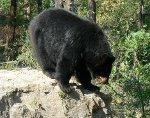 In the modern era, environmental news is high on the agenda for most organisations who report anything and everything from localised shrinking bee colonies to global climate change that affects almost everyone in the world. With so many different stories spanning the front pages and being in the headlines, we have collected a few of our top environmental and animal news stories from the week.
In the modern era, environmental news is high on the agenda for most organisations who report anything and everything from localised shrinking bee colonies to global climate change that affects almost everyone in the world. With so many different stories spanning the front pages and being in the headlines, we have collected a few of our top environmental and animal news stories from the week.A very rare sub-species of White Rhino has died in Kenya, meaning that the extinction of the sub-species is looming ever closer. The 34 year old male called Suni, was one of only two breeding Northern White Rhino's in the world and leaves behind him just six of his sub-species which includes five females and just a single male. Thought to live for between 40 and 50 years, the Northern White Rhinoceros is now one step closer to complete extinction with the latest news of Suni's death being a particularly disheartening blow to the world of conservation. Click here to find out more about Suni and the world's remaining Northern White Rhinos.

In India's north-eastern state of Arunachal Pradesh, plans to build the country's largest dam have been given environmental clearance, despite having been rejected twice in the past due to concerns that the reservoir created would submerge vast amounts of biologically rich forests deep under water. This enormous project will be constructed across the Dibang river, an area that is known for rich habitats and wildlife, despite an environmental assessment that claims no specialist wildlife was observed in the region. There is however, a mounting opposition to the plans both throughout the province and from environmental activists from around the world. If you would like to know more about the project please click here.
According to The Guardian, the two largest brands of tinned tuna in the UK are looking into revoking commitments they made to eliminate the use of fishing methods that have a big effect on other marine species including sharks, rays and turtles. Their website claims that they have seen documents that suggest Princes is likely to miss it's target this year as despite aiming to not use fish aggregation devices (FADs) by the end of the year, less than 25 percent of it's tuna is caught by not using them. Both Princes and John West are each responsible for around 1 third of all tinned tuna in the UK meaning this latest news would prove incredibly costly to efforts made to decrease the impact on other marine animals. To find out more, please read the full article.


